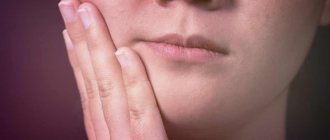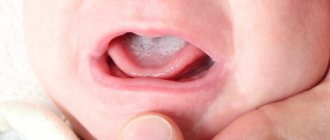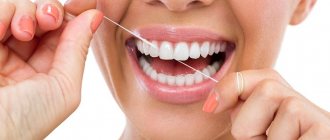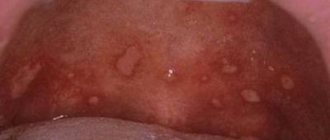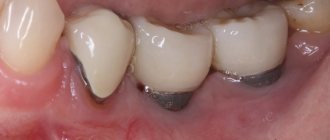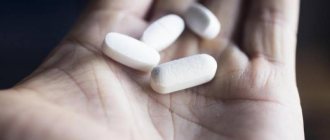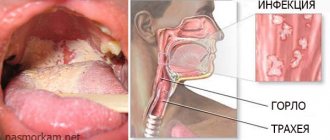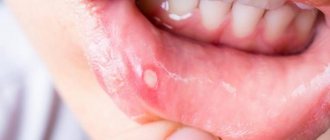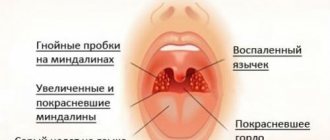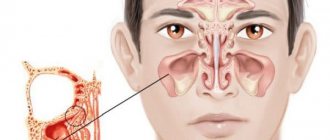Causes of sores in the mouth
The oral mucosa has increased sensitivity to adverse environmental factors. Wounds appear for the following reasons:
- Aphthous stomatitis refers to chronic diseases of the oral cavity. Manifests as ulcers, aphthae on the mucous membrane. With pathology, many ulcerative defects develop on the inner surface of the cheeks, tongue, and palate.
- Herpetic infection affects the skin, membranes, and internal organs. Herpetic stomatitis is manifested by numerous small ulcers, which are located in groups at the bottom of the oral cavity.
- The appearance of wounds on the mucous membranes of the mouth is caused by poor hygiene. Failure to comply with hygiene procedures is more common in children. Babies may suffer from Bernard's afte. They represent ulcerative defects that form on the hard palate from the mechanical impact of foreign objects.
- The wound appears from an accidental bite.
- A hard toothbrush, dentures, dentures, pointed crowns, the habit of biting the lips, and strong blows to the cheeks cause the defect.
- During treatment and dental procedures, the patient may receive minor injuries to the gums, lips, and cheeks from instruments. Dental implantation can also lead to various types of damage to the oral cavity. This is why, among other things, it is so important to trust the installation of implants to qualified specialists.
- The proliferation of fungi on the inner surface of the oral cavity is manifested by ulcers with white cheesy deposits. The first symptoms of candidiasis.
- Lack of vitamins and strong feelings lead to a decrease in local immunity and the appearance of pathological lesions in the mouth.
- Necrotizing periadenitis is manifested by compactions in the submucosal layer, which over time degenerates into painful ulcers. Healing of defects takes a long time.
D-panthenol
This is a tissue repair stimulator, a combination drug with dexpanthenol and chlorhexidine. D-panthenol
accelerates tissue regeneration, gives an anti-inflammatory and regenerating effect.
Chlorhexidine provides antiseptic properties and an antimicrobial effect that persists even in the presence of pus, blood and other organic secretions.
D-panthenol ointment is indicated as a therapeutic and prophylactic agent in the treatment of infected wounds:
- cuts, abrasions, scratches, scratches, cracks, diaper rash, trophic ulcers and insect bites;
- deep wounds after surgery;
The drug is applied to the wound up to 3 times a day. For infants, diaper rash is treated after changing the diaper. Cracked nipples should be smeared after each feeding.
Regenerating, anti-inflammatory ointment with bactericidal, wound healing and analgesic effects. The product belongs to effective dermatotropic drugs. Contains ethylcarbitol, TEG, glycolan, glycerin. Eplan acts on all layers of the skin, kills germs, bacteria, prevents suppuration, moisturizes the skin, relieves itching, pain, accelerates healing and prevents the formation of dry scabs.
Eplan is indicated for:
- any damage to the skin: wounds, cuts, bruises, cracks, abrasions;
- burns, frostbite;
- bedsores and trophic ulcers;
- insect bites.
has a cream base and is sold in 30 ml tubes. The product is applied externally twice a day until complete healing.
How and what to treat wounds on the oral mucosa
Defects in the mucous membrane are manifested by typical symptoms: pain that intensifies during eating, unpleasant odor, metallic taste. Pathology disrupts the normal rhythm of human life. He gets tired quickly and cannot eat due to severe pain.
Cheap antiseptics (iodine, brilliant green, peroxide), which are available in every home, will help remove unpleasant symptoms.
Gargling with hydrogen peroxide treats symptoms of acute tonsillitis. An antiseptic disinfects the oral wound from microorganisms that cause disease. The instructions for the drug indicate only external use. Representatives of traditional medicine advise diluting the medicine with water to avoid unpleasant consequences. Hydrogen peroxide is diluted: take 1 tsp per 120-150 ml of water. antiseptic. The solution should be warm to reduce irritation of the mucous membrane.
Before using the medicine, you should consult a medical specialist. Thus, specialists from the Ibn Sina dental clinic https://stomatologis.ru/ will help identify the true cause of the disease and determine the tactics for treating a wound in the mouth. Hydrogen peroxide is effective if the ulcers have a traumatic, bacterial etiology.
The medicine will not cope with fungi.
The medication can be used 4-5 times a day for 7-14 days. It's important not to overdo it. Incorrect dilution and frequent rinsing can lead to chemical burns of the mucous membrane. Following medical recommendations will help you avoid this pathological condition.
Methods for treating mouth wounds
Before starting treatment for wounds in the mucosa, you should understand the causes of the condition. If ulcerative defects are caused by another disease, it is necessary to fight the underlying pathology to reduce the size of the ulcers.
Wounds that appear from mechanical irritation with a brush or teeth are treated with antiseptic agents. They reduce the risk of bacterial flora attaching.
Therapy for the pathological condition is supplemented by diet, prescription of B vitamins, prevention of exacerbation of chronic pathologies, and elimination of stressful situations.
A patient with recurrent ulcers in the oral mucosa in the absence of treatment effect must undergo a set of tests to exclude a systemic disease of viral etiology (HIV, hepatitis).
Medication
- Chlorhexidine is an antiseptic solution that helps quickly treat wound defects in the mouth. The drug has antimicrobial and disinfectant abilities. Allergic reactions to the composition of the drug are rare. It is suitable for children. Wounds treated with Chlorhexidine can heal in 5-7 days. Rinsing should be done 3-4 times a day.
- Xikain gel has three main effects: reduces pain, destroys pathogenic flora, and relieves inflammation. The medicine is not used in children.
- Asept is a popular spray based on Lidocaine. The drug simultaneously anesthetizes and disinfects the inflammatory focus. The spray is used 2-3 times a day.
- Stomatidin destroys pathogenic microorganisms and disinfects the oral mucosa. The drug is widely used to combat the symptoms of stomatitis. It has a healing effect if you simply bite your lip.
Folk
- Representatives of traditional medicine recommend treating a wound in the mouth after a bite with decoctions of oak bark, chamomile, and calendula. They can be mixed or cooked separately. Take 1 tablespoon of the plant per glass of boiling water. The oral cavity should be rinsed with warm infusion 3-4 times a day.
- Furacilin, soda, and salt will help get rid of the problem. To prepare the solution you will need 5 tablets of the drug, 1 tsp of kitchen ingredients. The listed components of the solution are mixed in a glass of water. You will need 4-5 rinses per day to achieve rapid healing of ulcerative defects.
- A recipe with propolis helps with painful scratches. Take 1 teaspoon of alcohol solution per glass of water and rinse. Propolis relieves discomfort and promotes rapid healing. The soreness goes away within a week.
- Rinses with carrot, horseradish, and cabbage juice are used against stomatitis.
- Kombucha treats wounds in the mouth that form after injuries to the mucous membrane. Improvement occurs after the first rinse.
What folk remedies can cure the sore?
A variety of traditional medicine recipes can help you get rid of wounds and ulcers in the mouth. However, before using each of them, you should consult with your doctor so as not to cause harm to your health or provoke a worsening of your condition:
- Dissolve a teaspoon of honey in warm milk (50 ml), add the yolk of a chicken egg. Mix everything thoroughly and use the resulting mixture to treat the entire oral cavity no more than four times a day.
- Rinsing with a decoction of calendula flowers can speed up the healing process. To do this, add one tablespoon of crushed flowers to 250 ml of hot water, simmer over low heat for 10-15 minutes, strain, and cool.
- Dissolve the white of a chicken egg in 100 ml of warm boiled water. Use the resulting liquid to rinse your mouth every two hours.
- Wash fresh yarrow and chop finely. Using a piece of gauze, squeeze out the juice and add honey to it. For three weeks, take one teaspoon three times a day.
- Saline solution is used for rinsing. To do this, mix 250 ml of warm water and a teaspoon of salt. Carry out the procedure no more than twice a day.
- Soda solution. One teaspoon of baking soda equals half a glass of warm water. Rinse your mouth 2-3 times a day.
- To heal wounds and relieve inflammation, milk of magnesia is used - it is used to treat the affected areas several times a day.
- A solution of 3% hydrogen peroxide. Mix equal parts of water and the drug, wipe the wounds with a clean gauze swab several times a day.
- Dissolving ice cubes helps relieve inflammation and pain. If this procedure is difficult and painful, you can often drink cold water in small quantities.
Traditional methods should not be used without consulting a doctor and taking medications. Only complex therapy will give the maximum effect.
Review of effective ointments
- Bonafton is used in patients with herpetic lesions of the skin and mucous membranes. The drug has a negative effect on the herpes simplex virus. Suppresses the growth and reproduction of pathogenic microorganisms. The ointment is applied three to four times a day for 2 weeks.
- Solcoseryl is a medicine that is intended to improve metabolism and accelerate regenerative processes. The drug is prescribed for the treatment of inflammation of the cornea and blood vessels of the lower extremities. It fights the manifestations of stomatitis and gingivitis. The drug should be applied to the inflammation site 2 times a day. A positive effect is achieved 2-5 days after the start of treatment.
- Pimafucin has an antifungal effect. The active components of the cream suppress the vital processes of the microorganism. Pimafucin is intended for external use.
- Metrogyl Denta is an ointment for the treatment of wounds in the mouth. Consists of metronidazole and chlorhexidine. The products have disinfectant and antimicrobial properties. The gel is applied 2 times a day for 2-3 weeks.
Rinsing
To reduce the level of inflammation, you need to rinse your mouth with the following solutions: a solution of potassium permanganate (weak), a decoction of chamomile, calendula, coltsfoot, St. John's wort, a soda-saline solution, a solution of hydrogen peroxide, a composition of salt, soda and 2-3 drops Yoda. It is necessary to rinse your mouth with a warm mixture, at least 3-4 times a day, until a positive effect is achieved.
After the procedure, it is not recommended to eat or drink for half an hour, so as not to wash off the medicinal substance from the mucous membrane and reduce the therapeutic effect.
Decoctions of medicinal herbs are prepared by brewing dry raw materials with boiling water at the rate of 1 tablespoon per 250 ml of water. You can prepare a collection of herbs that have anti-inflammatory, soothing and healing effects.
The herbs calendula, sage, linden, mint, chamomile, plantain, and oak bark have this effect.
Features of getting rid of a purulent wound
A purulent wound in the mouth occurs as a result of the active activity of microbes. The condition is accompanied by severe pain and an unpleasant odor. Doctors recommend treating defects in the mucous membrane with antiseptic rinsing solutions and antibacterial ointments. It is contraindicated to pierce or squeeze out the pathological focus on your own to release the purulent contents.
Metrogyl Denta and Cholisal are used for treatment. Rotocan, Chlorhexidine, Givalex are suitable antiseptics. The products are used in dentistry to treat problems of the oral mucosa.
If the pathological process is accompanied by a prolonged increase in temperature, the appearance of pus in the wound, the question of systemic administration of antibacterial agents is raised. They suppress the growth and reproduction of pathogenic microflora in the mouth, promoting a speedy recovery. The selection of effective antimicrobial therapy is carried out by a family doctor or therapist.
Oral health
Our skin serves as protection for the body and prevents a lot of different infections. An open wound is always a target for infection, so it is important to keep your skin in excellent healthy condition.
Quite often situations arise when wounds and abrasions occur on the skin; special wound-healing ointments, available in a wide range of pharmacies, can help in such a situation. They have an antimicrobial and anti-inflammatory effect, and also provide a regenerative function for abrasions that occur on the skin.
In this article we will try to determine the best and most budget-friendly ointments for quickly getting rid of various damage to the skin, be it abrasions and scratches, or deep purulent wounds, and try to answer the question - which ointment is best to use in which specific cases?
Summary of the article
Rules for processing and treatment in children
Ulcerative defects on the mucous membrane in children appear when personal hygiene rules are not followed. Children can injure the inner surface of the oral cavity with foreign objects. Before starting treatment, it is better to consult a pediatrician. Pharmaceutical drugs, when used incorrectly, cause allergic reactions in children's bodies. You can treat a wound in the mouth using special ointments, gels, and powders.
Children are prescribed Solcoseryl, Chlorophyllipt, Stopangin, Furacilin.
At home, you can use an infusion of calendula or chamomile to wash ulcers.
Pain syndrome in children older than six months is relieved with Ibuprofen and Paracetamol.
When treating the oral mucosa, you must adhere to the following rules:
- You cannot independently increase children’s doses of medications or the frequency of administration.
- If the child does not know how to rinse his mouth, then it is necessary to lubricate the wounds with antiseptics. Do not allow your baby to swallow the medicinal solution.
- If allergic rashes appear, stop treatment and consult a doctor.
- When treating a wound, it is necessary to follow the rules of using aseptic techniques. Before treatment, wash your hands and lubricate the inflammatory areas with a clean cotton swab with the applied medication.
How do dental medications work?
In most cases, diseases of the oral mucosa manifest themselves in the form of unpleasant, disturbing signs:
- swelling;
- itchy sensations;
- soreness;
- redness;
- bleeding;
- mouth ulcers.
This course of the disease complicates the patient’s life, causes discomfort and distracts from everyday activities. But with proper treatment, it is possible to get rid of such symptoms quite quickly. To be completely cured, you will need to undergo a full therapeutic course. Only in this case will the painful symptoms not recur.
We suggest you read: Teeth hurt after alcohol - AlkoZdrav
Complex therapy includes drugs with local action: ointments, gels, creams. Most of them have a fairly fast effect, they eliminate pain, swelling and itching after just a few minutes.
Some of the remedies have 1-2 effects, while others, most often multi-component, can affect most symptoms. They act as an antiseptic, anti-inflammatory, analgesic, healing medicine:
- quickly relieve itching;
- heal damaged mucous membranes, including ulcers;
- reduce and eliminate bleeding;
- stop the inflammatory process, eliminating pathogens;
- form a protective layer in the form of a film on mucous tissues;
- strengthen gums.
How to get rid of an old encapsulated wound on the mucous membrane
An encapsulated wound on the oral mucosa indicates that the pathological process is ancient. If after 3-4 weeks of intensive therapy no positive dynamics are observed, the question of radical treatment is raised.
Old, non-healing wounds are treated with a minor operation performed by a surgeon. After removing the capsule, antimicrobial ointments are prescribed. They speed up recovery and prevent the development of complications.
Timely seeking medical help, early diagnosis of the cause of the pathology, and compliance with medical recommendations will help prevent the formation of an old lesion in the mouth.
The article has been verified by the editors
